Annie Patterson and Peter Blood return to Durham Friends Meeting for another singalong concert!
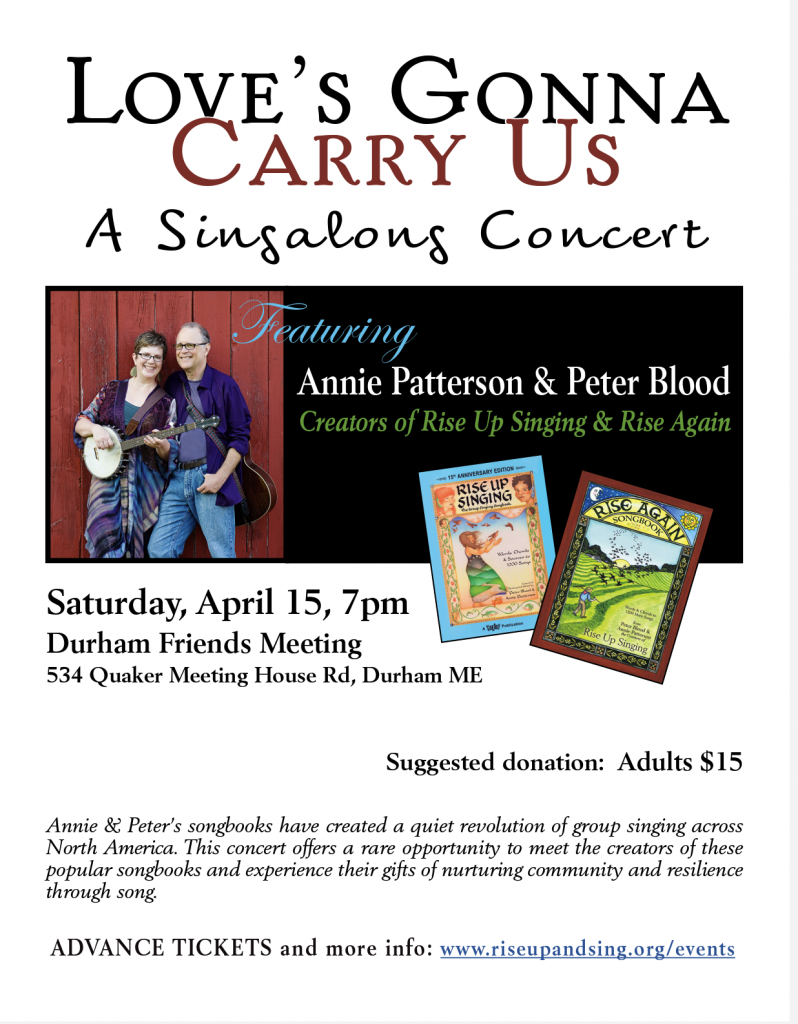
Information & tickets: riseupandsing.org/events

Annie Patterson and Peter Blood return to Durham Friends Meeting for another singalong concert!

Information & tickets: riseupandsing.org/events
Peace and Social Concerns Committee encourages us to watch “Fighting Indians,” a film to be shown on Maine Public (PBS) on April 6 (9pm) and April 8 (2pm).
They also encourage us to participate in a follow-up discussion of the issues raised by the film, via Zoom, on Monday April 10 at 7:00 PM.
This film tells the story of the struggle to change the name of the Skowhegan High School mascot. This was a contentious struggle that went on for years but ended successfully. This story has relevant lessons for the Peace & Social Concerns project to change the name of the 250th Anniversary Park in Brunswick. We recommend watching.
Maine Public TV Air Times:
Thur., April 6 at 9:00 pm
Sat., April 8 at 2:00 pm

On May 16, 2019, The State of Maine made history by passing LD 944 An Act to Ban Native American Mascots in all public schools, the first legislation of its kind in the country. For Maine’s tribal nations, the landmark legislation marked the end of a decades-long struggle to educate the public on the harms to Native “themed” mascots.
“Fighting Indians” chronicles the last and most contentious holdout in that struggle, the homogeneously white Skowhegan High School, known for decades as “The Home of the Indians.” This is the story of a small New England community forced to recon with its identity, its sordid history, and its future relationship with its indigenous neighbors. It is a story of a small town divided against the backdrop of a nation divided where the “mascot debate” exposes centuries-old abuses while asking if reconciliation is possible.
Produced by Mark Cooley, Derek Ellis and StoveUp LLC.
Learn more about this film at fightingindians.com.
New England Yearly Meeting’s Noticing Patterns Working Group is offering four “Learning Conversations” in April. They encourage attendance at one or more of these sessions as schedules allow.
These sessions will happen on April 5, 18, 25 & 26 from 7 to 8 pm.
The sessions focus on a topic (the first one is “making mistakes”) and use structured interactive learning activities to support Friends in understanding more about patterns of difference, patterns of faithfulness, and patterns of oppression. Those facilitating will also stay on for an additional 30 mins, till 8:30pm, for anyone interested in engaging in further discussion and/or Q & A.
NPWG intends for this to be a supportive space for exploring and learning together.
Peace and Social Concerns Committee calls our attention to an exciting new book. Here’s a review from Friends Journal:
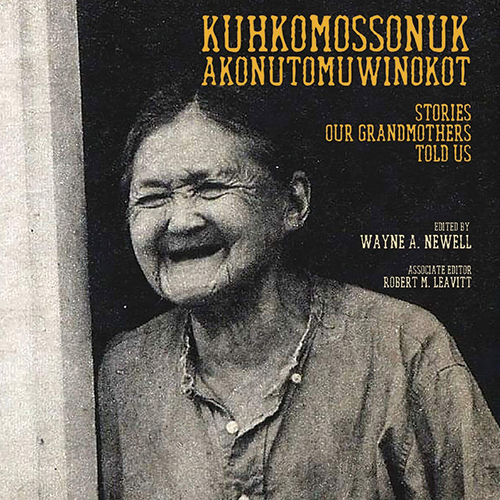
March 1, 2023
This collection of stories from the Passamaquoddy Indigenous community of Maine, Kuhkomossonuk Akonutomuwinokot: Stories Our Grandmothers Told Us, is a 45-year labor of love by Passamaquoddy editor Wayne Newell, who died in late 2021, several months after its publication (editor’s note: see his milestone here). He was born and grew up on Passamaquoddy lands. He founded a bilingual education program in the 1970s, served on the tribal council, and was president of the tribe’s Northeast Blueberry Company. His life intersected with Quakers when he was ten years old at a Quaker workcamp. In the 1970s, he directed American Friends Service Committee’s Wabanaki Program. In the 1980s and 1990s, he participated in “the Gatherings” with Quakers, Natives, and others to reimagine Indigenous–settler relations.
The collection is charming and engaging while also being scholarly. All stories appear in both Passamaquoddy and English with a pronunciation guide for the Passamaquoddy. There is a web address for an online Passamaquoddy Maliseet dictionary, maintained by the associate editor, that includes video recordings of native speakers using some of the words from the dictionary. The stories are also accompanied by illustrations in a variety of styles. Some of the stories were initially recorded on wax cylinders in the late-nineteenth century.
The first story, which was written in 1979, talks about daily life in the 1920s through the experience of Mary Ann, a girl roughly the age of the editor’s parents. It covers events like births and deaths, doing laundry, going to school, celebrating Halloween, and listening to stories told by her elders. This account helps readers understand how storytelling was a part of daily life. It is accompanied by a photograph of school children Mary Ann’s age with annotations identifying those children as people who grew up to help write this book.
The next group of stories are mostly about animals: ants, flies, crickets, and mice. To help readers appreciate the storytelling experience, the first story includes photographs of the storyteller gesturing with her hands and head to illustrate the story as she tells it. The photographs and drawing for that story are by the associate editor of the book, a linguist who also has been working for about a half-century on learning both these stories and the Passamaquoddy language.
The volume then turns to a series of stories about struggles between the devil and ordinary people. These are mostly trickster stories where the devil and ordinary people are trying to outsmart one another. One is a Job-like story where an angel and the devil try to win over a person to their side. In another, the devil asks an ordinary human to help split up a devoted couple. The human uses gossip to accomplish the task. The devil gives the person a bag of gold saying, “You’re more of a devil than I am.”
Another set of stories feature motewolon, which are people with extraordinary powers that are used for both good and bad purposes. They are also responsible for ghosts that sometimes cause trouble, often inspire fear, and at other times are simply mysterious.
The final collection is titled “Passamaquoddy Stories.” The protagonist for most of them is a superhero called Koluskap. In one tale, Koluskap tracks down a huge owl that is making the world too windy by flapping its wings. Koluskap puts the owl in a crevice, so it cannot flap its wings. Then the air becomes too calm. Koluskap extracts the owl in a way that permits it to flap only one wing. The result is the intermittent windiness of modern times. Humans are fearful of the power of Koluskap, but usually those powers are used to benefit them.
Koluskap is also the protagonist in Aladdin-style stories of fulfilling human wishes that lead to unexpected results. For example, a man who wishes to be loved by women is accosted by young women who literally smother him with their attention resulting in his death. The story ends with this statement: “What happened to the maidens is not known.”
The book gives readers insights into several aspects of Passamaquoddy culture as well as an appreciation for the imaginative creativity of that culture.
David Etheridge is a member of Friends Meeting of Washington (D.C.), clerk of the Baltimore Yearly Meeting Working Group on Racism, and previously worked for over 20 years as an attorney in the Indian Affairs Division of the Solicitor’s Office of the U.S. Department of the Interior.
Tess Hartford, Recording Clerk pro tem
Durham Monthly Meeting of Friends met for the conduct of business on Sunday, March 19, 2023 with 13 people attending from the Meetinghouse and 2 by Zoom.
1. Meeting Opening
Clerk opened the meeting by asking approval of Tess Hartford to be Recording Clerk in Ellen Bennett’s absence. Friends approved this request.
Clerk then gathered Friends with reading of the theme from Cuba Yearly Annual Meeting of Sessions.
Theme: Quakers that the world needs: becoming the sower’s of hope”;
Text: Timothy 14:10 and the paragraph from George Fox’s journal: sing and rejoice ye children of the day and of the light, because the Lord is at work in the dark night…”
The lessons were from Hebrews 11, (“Now faith is confidence in what we hope for and assurance about what we do not see”) and Romans 5:3-5 (“we also gloryin our sufferings, because we know that suffering produces perseverance; perseverance, character, and character, hope”)
2. Approval of Minutes of February 2023– Ellen Bennett
Minutes were approved as submitted.
3. Finance Committee Report—Nancy Marstaller
A request was made to change the date of the threshing session scheduled for March 26th, to the 4th Sunday in April, the 23rd. After the rise of Meeting
Meeting approved the change.
Request for approval of a gift of $1,000.00 from the Charity account to assist Dorothy Curtis financially on her trip to Kenya for the United Society of Friends Women Triennial Gathering In July.
Meeting approved this gift.
4. Peace and Social Concerns Committee—- Ingrid Chalufour
Clerk read a letter crafted by Cushman Anthony in response to the article from Angus King on his position concerning LD-6707 regarding Maine Tribal Sovereignty. A few minor changes were made, after which the letter was approved.
Meeting approved the letter
FCNL has requested of all Quaker Meetings to discern whether or not it should take up the issue of Reproductive Health. PS&C committee members thoughtfully considered this request and made its recommendation to the Monthly Meeting. Two key points were made in these regards. First, historically this has been an issue that Friends have not been able to find agreement on and it would be difficult for FCNL to find a position we could all support. And second, the sense of the committee is that this issue already receives a substantial amount of funding and support. Where FCNL’s resources might be better focused, in their opinion would be in the area of international relations and our defense budget, as this would align with our Quaker value of world peace.
The Social Justice Enrichment Project is preparing a grant proposal to be submitted to the Obadiah Brown Benevolent fund before April 15th. The funds would be used to research the effects of this project to learn more about how the books are being used in the classrooms and what the benefits are to the children. The teachers along with consultants will continue to work with Linda Ashe-Ford as well as Mikku Paul,who is a Maliseet early childhood educator and consultant. The design of this project is to produce materials for teachers and a guidebook for New England Meetings. The requested amount from the OBBF is $7,000.00. PS&C has itself used its budget of $2,000.00 as the Meeting contribution to this project.
5. Statistical Report—— Sarah Sprogell
At the beginning of 2022 we had 101 members and at the end of the year we had 96
There were 4 deaths and 1 resignation.
We had 1 transfer of membership.
We do not have a First Day School
Average attendance at Sunday worship- 25-30 people, including those present in the Meetinghouse and those on Zoom.
Business meeting attendance averages 17 people, again present and virtual.
6. Ministry and Counsel—Clerk, Renee Cote
The 5th draft of the State of Society Report was read aloud to all participants.
Sarah Sprogell suggested a reorganizing of the various content fields for greater cohesiveness as a finished report. The draft as it was presented was wholeheartedly approved with gratitude, but agreed to the realignment of paragraphs as long as the content remained intact.
Meeting approved the State of Society report.
7. Trustees—- Sarah Sprogell
There was no report from Trustees this month
8. New Business
Kim Bolshaw brought a request form Portland Monthly Meeting and Durham Monthly Meeting to add the Mission Church/Meeting of Calderon, Cuba to the Velasco Meeting. Calderon is at the farthest edges of Cuba Yearly Meeting in Velasco, our sister city
Portland Friends also asks Durham Friends if we would hold their funds designated for the CYM under our care and create an account exclusively for these funds. These funds are separate from the NEYM, Puente de Amigo funds.
Meeting approved these two requests
Clerk of Finance will create the new account.
Clerk, Leslie Manning read a letter from FCNL’s General Secretary, Bridget Moix regarding its compassionate statement in response to the Supreme Court reversal of Roe vs.Wade decision on abortion. Clerk asked all present to prayerfully share thoughts without discussion, comment or debate as a way to discern our position as a Meeting on this issue. Friends shared respectfully and with heartfelt expressions of concerns. It was acknowledged at the conclusion of sharing that we at Durham Friends are not in unity on this sensitive and weighty subject.
9. Meeting Closing
Meeting closed with waiting worship and a deep sense of gratitude.
The delegation consisted of Kim Bolshaw from Durham MM, and Hannah Colbert, Sue Calhoun and Fritz Weiss from Portland MM. Here’s a photo of the four with the mission church in Calderon
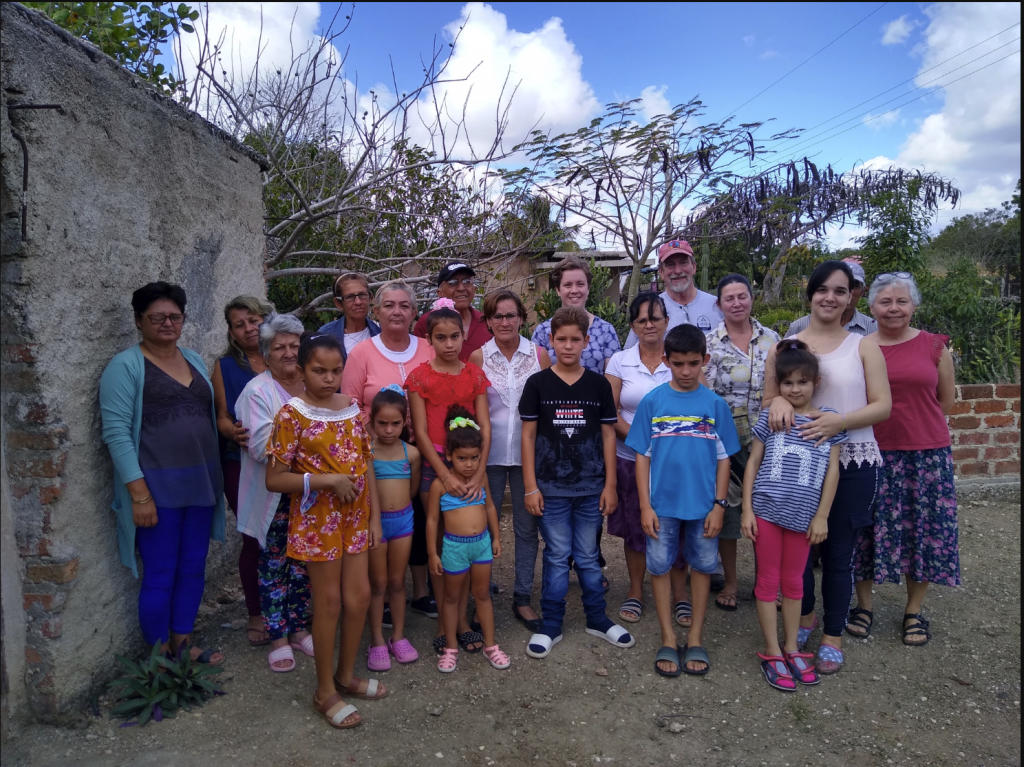
The materials for Durham Friends Meeting’s March 19, 2023 Meeting for Business are available at this link.
Agenda
Opening reading and worship
Minutes of Previous Meeting (available here)
Finance Committee Report
Peace and Social Concerns Report
Ministry and Counsel Draft State of Our Society
Statistical Report
+++ Break +++
Listening Session on FCNL Request for Legislative Priority (Materials here)
Closing Worship
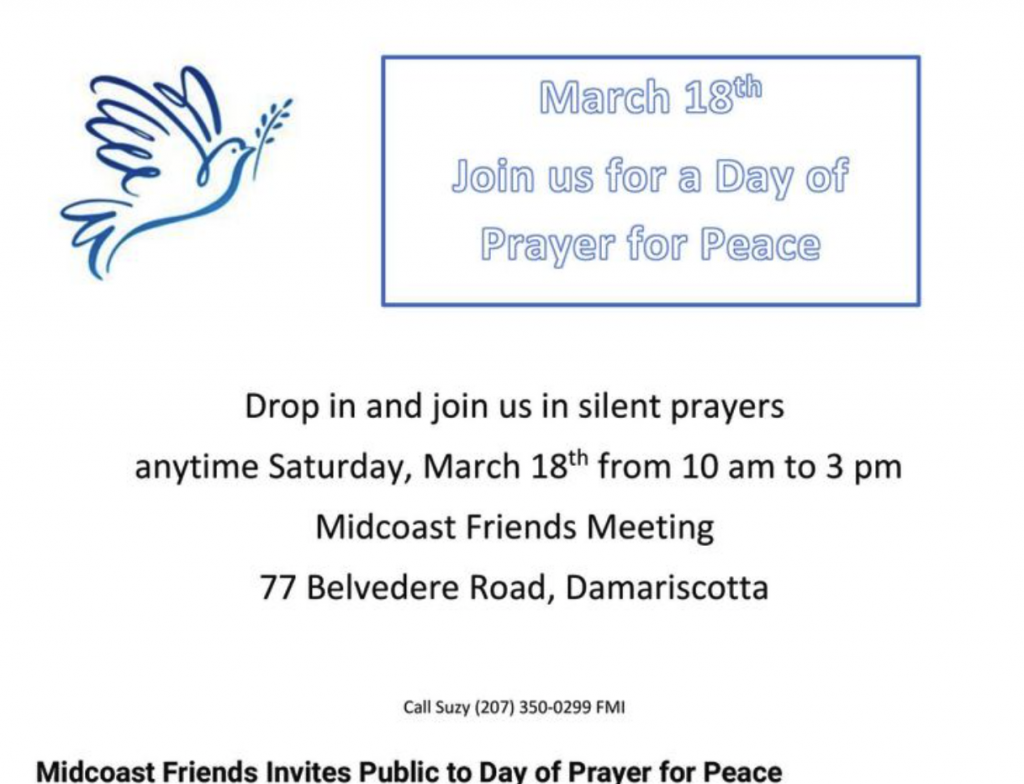
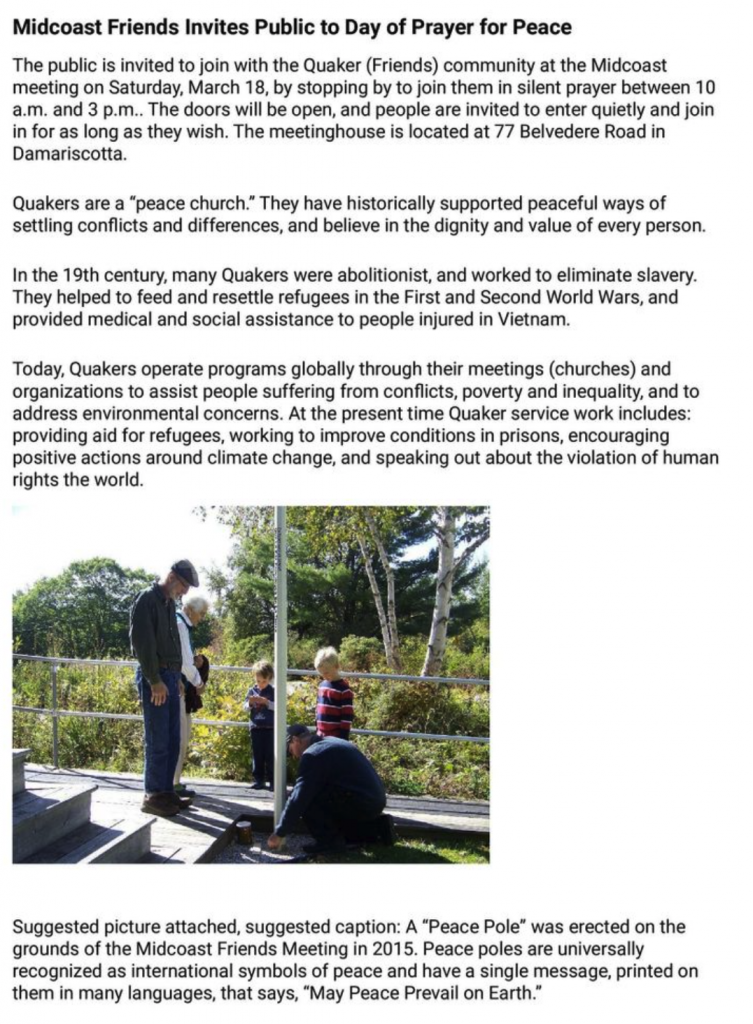
Friends Committee on National Legislation (FCNL) is asking for input from Friends and Friends Meetings regarding the stance it should take regarding Reproductive Health Care. We are being asked to discern if we recommend that reproductive health should be included in FCNL’s legislative priorities.
On Sunday, March 19, Durham Friends will hold a one hour discernment session at the rise of Meeting for Worship for the Conduct of Business. If it is necessary to schedule another session, we will do so in April, as our recommendation is not due until May 1.
As requested, let us hold this matter tenderly. There is a virtual opportunity for learning on March 22 at 6:30 PM Supporting Friends Discernment on Reproductive Health. All are welcome.
What follows is the request from FCNL and some guidelines for participation
We greatly value your engagement with this complex issue, and we encourage you to hold compassion for each other during these conversations. Continue to seek Divine Guidance and Spirit’s revelation as you weigh deeply the way forward for FCNL—one that respects the different religious and moral perspectives we all carry.
Your responses are requested by May 1, 2023. Your group can submit them electronically (preferred) at fcnl.org/policycommittee or by emailing policycommittee@fcnl.org. Postal submissions can be sent to 245 2nd St, NE, Washington, DC 20002.
Please note that during its discernment, the Policy Committee will give greater weight to group responses over individual responses.
What follows are guidelines for participating in this conversation, resources to support your discernment, and answers to frequently asked questions. You can also join us on March 22 at 6:30 p.m. EST for a virtual event to aid your discernment. Click here to register.
Thank you again for your faithful and spirit-led discernment.
 | In peace,Ebby LuvagaClerk, FCNL Policy Committee |
Whether you are gathering in person, online, or in a hybrid format, we hope that your discernment will be spiritually grounded and a result of group conversations. These discussions may take many forms, including discernment by a committee, an informal group, or a First Day discussion topic. Some meetings or churches may adopt a minute expressing the sense of their group, although this is not a requirement.
You may want to prepare for discernment by reading the pamphlet, A Guide to Dialogue About Abortion. Tools such as this can help your conversation honor the complexity and urgency surrounding this topic.
Tips shared include honoring stories from lived experience, taking short breaks for moments of reflection, and building cultures of trust and understanding. Also refer to FCNL’s Policy Statement, The World We Seek (Section III.2.6), which outlines FCNL’s current statement on abortion issues.
To allow for the inclusion of a diversity of voices, we hope you will include people of different ages, backgrounds, and lived experiences in your discernment. Please identify at least one person who will submit your group’s responses.
After an opening period of waiting worship, the gathering might begin with a brief description of the discernment process and the purpose of gathering. Participants may share their concerns about reproductive health care based on the queries provided to support their discernment process.
How to Submit your Group’s Responses
Please respond by May 1, 2023. Your group can submit electronically (preferred) at fcnl.org/policycommittee or by emailing policycommittee@fcnl.org. Postal submissions can be sent to Amelia Kegan, 245 2nd St, NE, Washington, DC 20002.
What information should you record?
Please include the following information as part of your submission:
What happens to the responses after FCNL receives the submissions?
The FCNL Policy Committee, a working group of the General Committee, will read all the responses and meet to consider what meetings, churches, groups, and individuals are telling FCNL regarding reproductive health care. They will share their summary with FCNL staff and the FCNL Executive Committee, then hold listening sessions with the General Committee in the summer of 2023.
The Policy Committee will bring its recommendation to the FCNL General Committee during its Annual Meeting in November 2023.
Throughout the process, the discernment by Friends across the country remains at the center of the committee’s consideration.
Where can I find more information?
You can find the contents of the previous mailing here. If you have additional questions, contact Policy Committee members Ebby Luvaga (luvaga@iastate.edu) and Genie Stowers (gstowers835@gmail.com).
Peace and Social Concerns calls our attention to two presentations about Wabanaki related matters. Both will be via ZOOM, and both require prior registration.
March 8: Why Tribal Sovereignty? 6:30-8:00 pm, Via ZOOM;
UPDATE: link to introductions here; link to presentation here
A discussion with Maulian Dana, Penobscot Nation Ambassador & President of the Wabanaki Alliance.
Maine, alone among all other states in the U.S., does not recognize the sovereignty of the federally recognized tribes in our state—sovereignty honored in the U.S. Constitution and inherent in the Wabanaki people who have lived on and stewarded this land we now call Maine for thousands of years. Bills submitted to the 131st legislature seek to restore Wabanaki tribal sovereignty in a step towards repairing the broken tribal/state relations. Join us in learning why acknowledging and restoring Wabanaki sovereignty will benefit all people who live in Maine.
This event is a collaboration of Midcoast Indigenous Awareness Group, Unitarian Universalist Church of Brunswick Maine, and Curtis Memorial Library
Date: Wednesday, March 8, 2023; Time: 6:30pm – 8:00pm
This is an online event. Registration is required. Event URL will be sent via registration email.
March 17: Federal Indian Policy: Impacts on the Wabanaki Nations in Maine…And Beyond, Noon to 1 pm, via ZOOM; registration required
A recent report from Harvard University found that “the subjugation of the Wabanaki Nation’s self-governing capacities is blocking economic development to the detriment of both tribal and nontribal citizens, alike. For the tribal citizens of Maine held down by MICSA’s restrictions, loosening or removing those restrictions offers them little in the way of downside risks and much in the way of upside payoffs.” Professor Joe Kalt, co-director of the Harvard Project on American Indian Economic Development at Harvard University’s Kennedy School of Government, will discuss results of the Project’s recent study of the impacts of the unique provisions of the Maine Indian Claims Settlement Act on the Wabanaki Nations.
Present: Dorothy Curtis, President, Nancy Marstaller, Treasurer, Susan Gilbert, Secretary, Dorothy Hinshaw, Marian Baker, Qat Langelier
Cards: For Friends.
Program and Devotions: We took turns reading from Blueprint, the Program, “Abounding in Hope” by Ruthie Tippin.
– “May the God of hope fill you with all joy and peace as you trust in him, so that you may overflow, abounding in hope by the power of the Holy Spirit,” Romans 15:13.
– Summarizing Ruthie Tippin, we can find God in simple, ordinary people and things, if we pay attention.
– In the words of Job Scott, Quaker Friend, in 1765, heaven within begins in (quoting Matthew), “. . . the least of all seeds.”
– Ruthie Tippin bids us to “imagine carrying the seeds of divine life in your pocket each day. Hope. Joy. Peace. Trust.”
– In summation: Starting with what we have, acting in hopefulness, trusting in God, we move from helplessness to hopefulness.
Minutes: Susan read the minutes from the 1/16/2023 meeting.
Treasurer’s Report:
$168.06 in checking
$2198.29 in CD (for Triennial expenses)
Total $2366.35
(plus $25 in savings)
Please note: Nancy Marstaller, Treasurer, will send a detailed version of the annual financial report to anyone interested.
Prayers: For Friends.
Tedford Meal: Team C prepared meat loaf, veggies, baked potatoes and dessert. Next month, Team D, Dorothy Curtis, team leader, will bring the meal.
Other Business: Marian Baker spoke with us in depth about upcoming USFW plans.
–There will be a board meeting of USFWI March 23 – 25.
–The hybrid Northeast Regional Gathering is May 6 and 7 in Buffalo, NY. Marian is going to both events and welcomes anyone interested to contact her.
– The USFWI Triennial will be held in Nakuru, Kenya July 2 – 8.
– The World Day of Prayer on July 1 will be spent in prayers and singing in Kenya.
– Dorothy Curtis hopes to travel to Africa with others from our area.
– Dorothy Hinshaw has boxes of books for Kenya which Marian will look over.
– Marian is working with Senator Jeanne Shaheen of NH and Elizabeth Warren of MA to help a Kenyan woman pastor get a visa to visit the US.
Dorothy Curtis ended the meeting with a poem by Florence Earle Coates:
Who Walks The World With Soul Awake
Who walks the world with soul awake
Finds beauty everywhere;
Though labor be his portion,
Though sorrow be his share,
He looks beyond obscuring clouds,
Sure that the light is there!
And if, the ills of mortal life
Grown heavier to bear,
Doubt come with its perplexities
And whisper of despair,
He turns with love to suffering men—
And, lo! God, too, is there.
Respectfully Submitted, Susan Gilbert
Portland Friends Meeting will host a Bread Day gathering for local Friends on March 4th. Arrive between 10:30am and 11am and we’ll end between 4:30pm and 5pm.
We will nourish our bellies and our spirits by worshipping and baking together and building relationships across generations. All ages are welcome, especially youth and families.
This year, Portland’s Bread Day will just be in person, with no hybrid or online component.
Watch this sweet little video about what Bread Day was like last year across the whole Yearly Meeting. Read more about Bread Day here.
approved, March 19, 2023
Durham Monthly Meeting of Friends met for the conduct of business on Sunday, February 19, 2023, with 8 people attending from the Meetinghouse and by 4 Zoom.
1. Meeting Opening
Clerk opened the meeting with a period of silent worship and read from Friends Committee on National Legislation “Tips to maintain dialogue across disagreement: Listen empathetically. Ask open-ended questions. Share your story, rather than argue over facts.” Listen, ask, share…..
2. Website Tour — Doug Bennett
A tour of Durham Monthly Meeting’s website was conducted by the Meeting’s web coordinator, to familiarize Meeting members with this resource. Beginning with a shared image of the DFM homepage, each of the elements of the homepage were reviewed.
The website is made up of a number of “static” pages: e.g., a page for Visitors, one titled “Our Meeting” which has a number of additional links, a page for Peace and Social Concerns, etc.
All information posted on the website comes through a Meeting committee. The one page that is not static is the News and Messages page. This page is updated regularly with messages given at meeting, as well as invitations to events.
Because there are a great number of documents available through the website, there are two search boxes to assist in finding specific documents. A list of categories, which is also available, may assist in finding specific information.
There are three important uses of the website: 1. Giving immediate shared access to information, which is posted within 24 hours of being received. 2. As an on-line archive. 3. As a tool for outreach — the website is findable by anyone, not just members.
The weekly email, “This Week at DFM” includes hot links to everything that has been added recently to the website.
Members noted that the website is another way to keep us connected as a community. Others noted that Friends from other meetings have complimented the webpage. Doug received thanks for his work.
3. Approval of Minutes of January 2023 — Ellen Bennett
Minutes were approved as submitted.
4. Finance Committee Report — Nancy Marstaller
Clerk pointed out that a total of 4 documents were distributed, including end-of-year reports.
Highlights of the end-of-year report from 2022 were noted. The Meeting is in good financial shape. Our weekly contributions were down, but this deficit was countered by bequests and end-of-year giving. Our expenses were also lower for 2022, leaving us in good financial shape. Only 67% of what we budgeted in expenditures was spent.
A summary of expenses outside of our regular operating expenses was also provided.
A Balance Sheet was presented. The question was raised as to the division of restricted vs. unrestricted money. Finance Clerk responded that all money reported on the Balance Sheet is unrestricted. The difference between “designated” and “restricted” funds was explained.
Finance Clerk then reviewed the financial report for February.
The Finance Committee asks the Meeting set a date for a Threshing Session. The agenda should include determining a tithing amount for building Charity funds, as well as the use of the Parsonage funds. Clerk suggested March 26th.
The date of Sunday, March 26th for a Threshing Session was approved.
The Meeting also approved up to $1000 from Charity account to support Dorothy Curtis to attend the United Society of Friends Women—Kenya, Triennial, in July. These funds would be added to funds from other sources.
Meeting approved this support.
5. Ministry and Counsel — Renee Cote, Tess Hartford
Regarding someone to provide tech support, the best solution has been discerned to be someone with technology expertise. Several suggestions have been made. It was noted that it might be best if this person is not a member of the meeting; tending to tech issues can take away from the worship experience. The feeling was expressed that we should still have volunteers, Meeting members, available to assist as back-up. Asking someone to come every Sunday for just a couple of hours might be difficult. A paid person could be responsible for technology set-up, checking to make sure that things are working, with Meeting-member volunteers to work during worship.
To improve the technology set-up, microphones would be rearranged. The current mic at the podium would be replaced by 2 free-standing mics. Hand-held mics have also been used successfully in other places, and should be tested in the Meetinghouse.
M&C will continue to discuss this issue and bring a recommendation back to the Meeting.
Ezra Smith’s request for Meeting membership was brought forward. The Clearness Committee will be providing a letter of support for Ezra to be included with these minutes. Committee members were asked to provide a summary of the conversation with Ezra. The best date to welcome Ezra into Membership will be determined.
The Meeting united in joyfully approving Ezra’s request for Membership.
The Meeting Care Coordinator job description was read and reviewed. M&C is looking for suggestions and approval of this description. The suggestion was made to add that the MCC would reach out to the co-Clerks of M&C for counsel support as needed. In addition, the recommendation was made to add that preference for hiring would be given to a person with familiarity with Quaker programmed or semi-programmed meetings for worship and Quaker values.
The financial implications of hiring an MCC as well as a technology person, and perhaps a new youth minister, given that our weekly income has dropped off significantly of late, raises the question: Are we financially sound? Can we afford this easily? The tech support position might cost the Meeting more than an MCC. The funds have been budgeted for MCC for 2023. If the wish is to move forward with two positions, the Meeting has to make certain that it has funds to support both.
The Meeting approved the job description as amended.
The Meeting approved that M&C post the job description and seek applicants.
6. Trustees — Sarah Sprogell
No action items were brought forward with the Trustees report.
Trustees informed the Meeting that an outside group is renting and would be using the Meetinghouse this coming week.
The dates that outside groups are using the Meetinghouse are posted on the Google calendar via the website, as well as the paper Meetinghouse calendar posted in the Gathering Room.
7. Peace and Social Concerns — Ingrid Chalufour
Clerk read the Peace and Social Concerns report. There were no action items.
8. New Business — Leslie Manning
Wendy asked to bring a presentation from MEIRS of Lewiston on the fourth Sunday in February at the rise of meeting.
The Meeting approved this event.
Request for concert — Peter Blood and Annie Patterson requested use of the Meetinghouse to host a concert at the end of April. A concern about masking was raised, given that their concerts are sing-alongs. Because it is important to be consistent about masking, the Meeting agreed that it is appropriate to ask concert-goers to be masked, but not Annie and Peter. Intergenerational special events group will take the lead on coordinating this.
Meeting approved hosting the concert.
9. Closing Worship
Clerk thanked everyone for hard, concerted work in listening to one another and lifting up concerns about our work together, and particularly hold M&C in the light as they prepare the State of Society Report. Hold one another tenderly, and listen together for God’s will for our community.
Clerk closed the meeting with moments of silent worship, and a reading Ezra’s letter of intent to become a member of Durham Friends Meeting.
Respectfully submitted,
Ellen Bennett, Recording Clerk
Friends Camp is seeking to hire kitchen assistants for this summer, June 16 to August 19. Friends Camp is located in China, Maine.
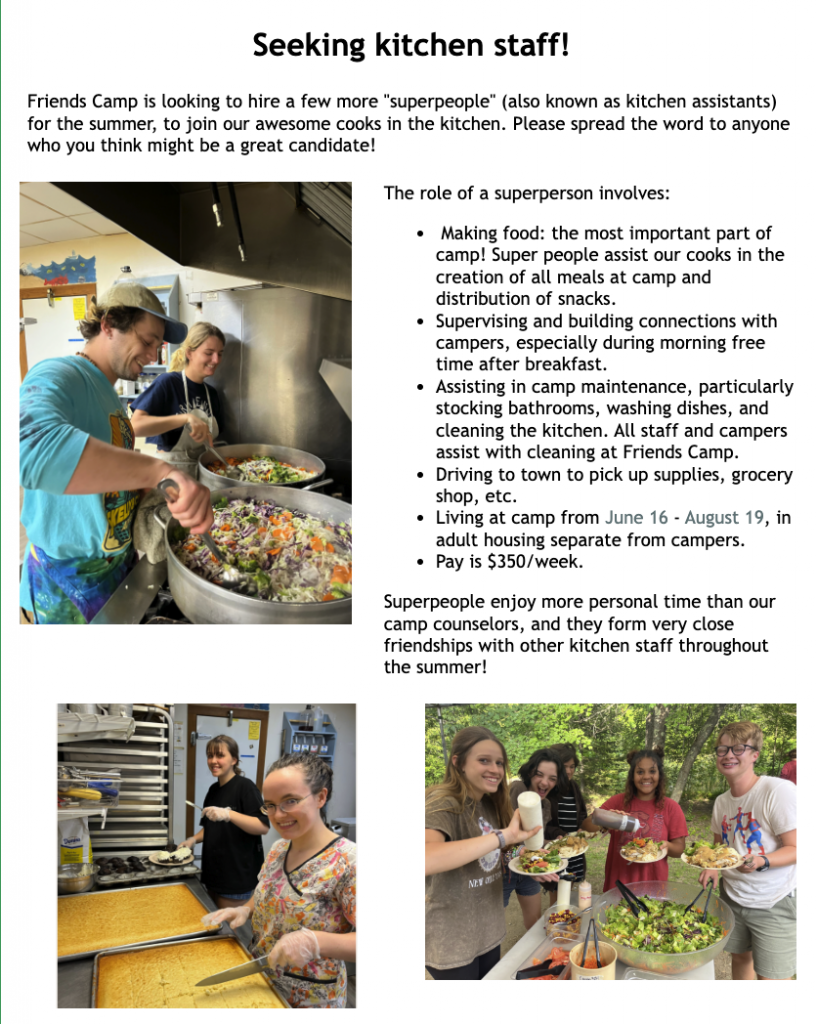
Here is more from Friends Camp from their most recent newsletter:
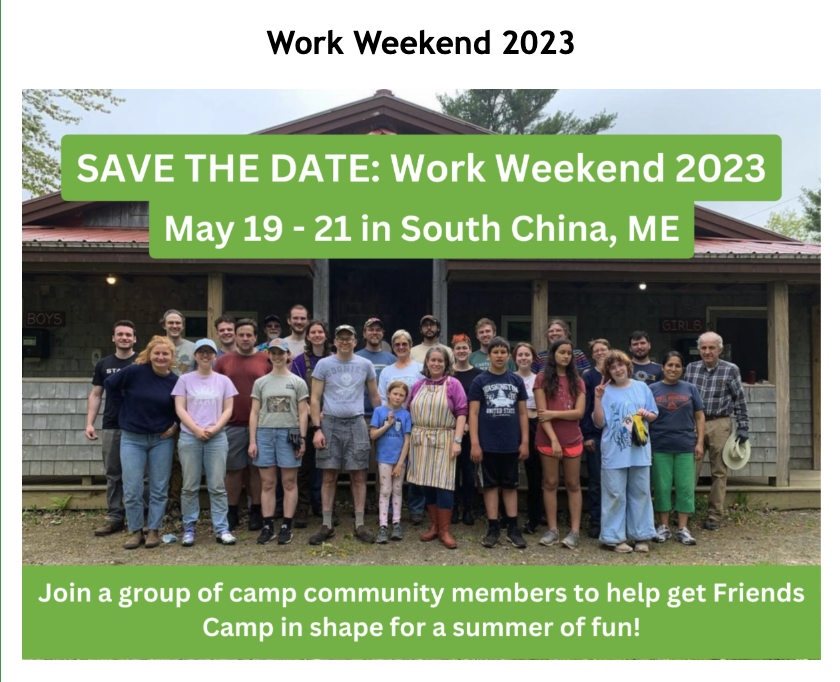
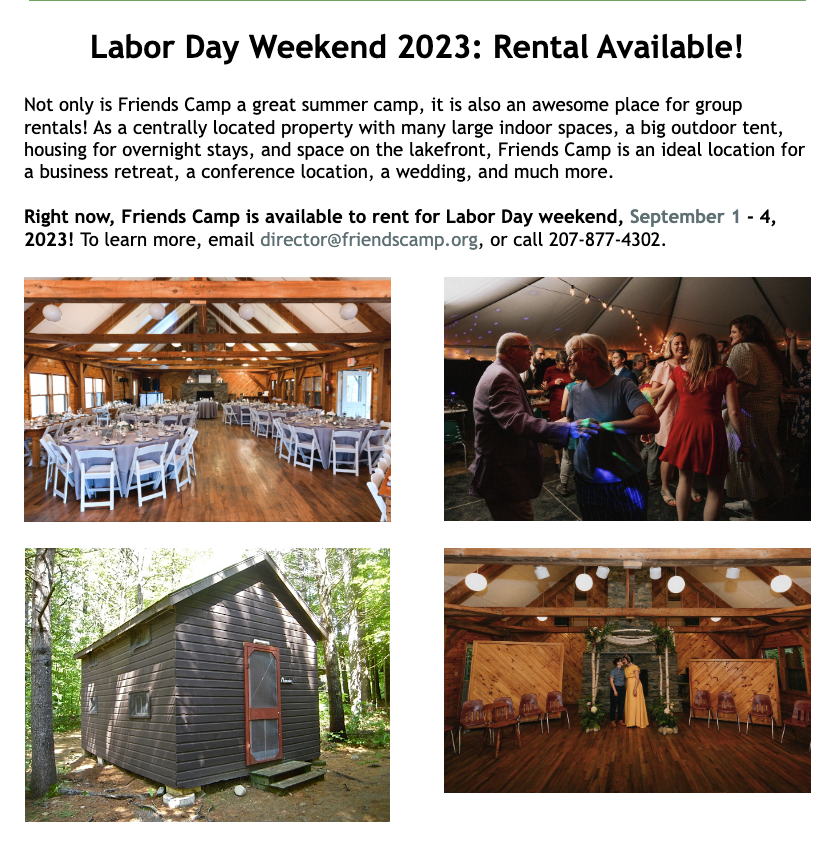
Durham Friends Meeting member Craig Freshley will offer a workshop at the upcoming meeting of Friends World Committee for Consultation/ Section of the Americas to be held March 23-26, 2023. Flyer here.
The Workshops at the gathering will be held on Saturday, March 25, from 1:30 to 5:00 pm. Here is how Craig’s workshop is described:
Together We Decide: Practical Tools for What the World Needs
Of course there are moral reasons for collaboration and inclusive decision making, yet in this dynamic and interactive workshop Craig will explain the practical benefits for helping all voices be heard. And he’s going to teach us how to do it. By telling stories and explaining techniques, Craig will equip you and inspire you to help your own group make decisions together so tensions resolve and way opens for peace and prosperity. Handouts and other resources provided.
+++
The event will be held in North Carolina (in person registration here) and you can also attend via Zoom (online registration here). The gathering is offered on a pay-as-led basis.
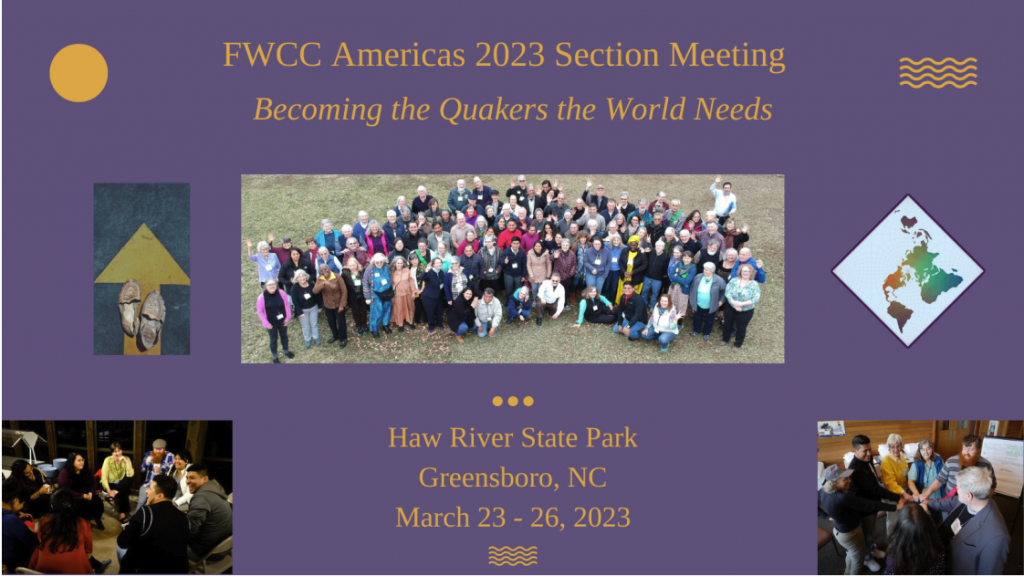
The materials for Durham Friends Meeting’s February 19, 2023 Meeting for Business for Worship are available at this link.
Proposed Agenda for Meeting for Worship for the Conduct of Business, February 19, 2023
Opening Reading and worship
Website Tour
Minutes of Previous Meeting (available here)
Finance Committee Report
— Request for Threshing Session
— Charity Fund Request
Ministry and Counsel Report
— Meeting Care Coordinator
— Membership Recommendation
Trustees Report
Peace and Social Concerns Report
New Business
— Request for Concert
— MEIR info session
Closing Worship
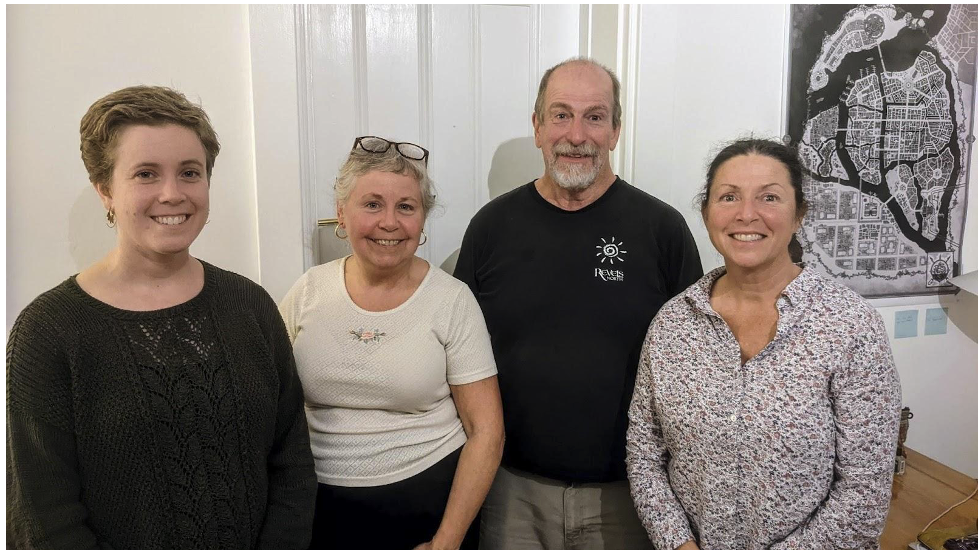
Left to right: Hannah Colbert, Sue Nelson, Fritz Weiss, and Kim Bolshaw are traveling to the NEYM “Puente de Amor” (“Bridge of Friends”) from February 15 through February 27. May we join with them spiritually, through prayer with light and love. They will visit our sister Meeting, Velasco Friends Meeting.
We are excited to announce a next chapter in the ongoing experiment of daylong opportunities for spiritual nurture and intergenerational relationship, what we have called “Living Faith.” On April 1, 2023, after a four-year absence, we are looking forward to greeting Friends again in Portland, Maine. More details and registration info is coming soon. In the meantime, please mark your calendars!
A refresher on Living Faith: the Living Faith gathering is an opportunity for Friends new and old (and the Quaker-curious) to get to know one another, hold multigenerational worship together, participate in interactive workshops, eat tasty food, share the different ways we experience and live our faith, and build community. Age-appropriate youth programming and childcare will be available, in addition to some parts of Living Faith programming being intergenerational, like worship. More about a teen-specific offering below.
Workshops sought for Living Faith
We are now seeking workshop proposals for the April 1st Living Faith gathering in Portland, ME. Our 90-minute workshops provide an opportunity for adult and teen Friends to explore their Quaker faith, connect around an area of interest, and make meaningful connections through activities, conversations, or worship. Do you have a workshop idea? Experienced and emerging facilitators alike are invited to submit a workshop proposal by February 5th. Details here.
Living Faith teen retreat
New this year is a weekend retreat for teens built around participating in Living Faith together. Youth age 13-18 are invited to arrive on Friday evening, sleep over on site on Friday and Saturday nights, and participate alongside adults and families at Living Faith on Saturday. There will be time on Friday and Saturday nights for teens to connect with one another, share what the experience was like for them, and have fun with their peers, with support from a few adult staffers. Contact Maggie Fiori (Teen Ministries Coordinator) for more info.
January 16, 2023
Susan Gilbert, Secretary
Present: Dorothy Curtis, President, Susan Gilbert, Secretary, Kim Bolshaw
Dorothy quoted for Martin Luther King Day his statement that “hate doesn’t get rid of hate, love does.”
Card Ministry: Kim will send cards to Friends. She will obtain a copy of The Advocate, which lists names and birthdays of Quaker missionaries and make cards to them available for Durham Friends to sign after Meeting.
Program and Devotions: Kim brought the program using the Pendle Hill publication “Quaker Life” on the subject of gentleness by Melissa Snyder. Gentleness as our response should not be thought a sign of weakness. The Lord asks that our gentleness be an action, not just a response. The Holy Spirit inspired Paul to say, “Let your gentleness be evident to all.” “Clothe yourselves with compassion, kindness, humility, gentleness and patience.” We can emulate Christ by using positive communication and patience in interactions such as teachers advocating for children with their parents. We can listen and allow ourselves to hear the still small voice of God.
Treasurer’s Report: Since November we received $5 in dues and $100 in memory of Helen Clarkson, Charlotte Anne Curtis and Margaret Wentworth. We paid $38.13 for Blueprints publication and have a balance of $111.05 in the general account. We have $2023.67 available for triennial expenses.
Minutes: Susan read the minutes of the 12/19/22 meeting.
Next Meeting: February 20 at 7 PM.
Prayers: For Friends healing and safety in travel.
Tedford Meal: Team B’s meal for January 2 was roast beef, potatoes, green bean casserole, salad, brownies, oranges, ice cream and cookies. Next meal will be prepared by Team C, with Sarah Sprogell team leader. Tedford Meal Teams would appreciate contributions of food or donations toward the meal. Teams with each leader’s name and phone number are posted at the Meeting House.
New Business: Dorothy Curtis will be traveling to Africa and Kim Bolshaw will be traveling to Cuba in 2023, and both will record their experience in photos. Dorothy will contact Marian Baker, who is also going to Africa for the Friends United Meeting, United Society of Friends Women International Triennial, to be held in Nakuru, Kenya, in July, 2023. Kim, with three Portland Friends, will visit our Sister Meeting in Velasco, Cuba from February 15-27. The trip will include a visit to Cuba Yearly Meeting, which is from February 16 to 20.
Dorothy ended the meeting with a quote she found in the book “Wonder of Comfort”:
“God shall be my hope, my stay, my guide and lantern to my feet.”
—William Shakespeare
Respectfully submitted, Susan Gilbert
Present
Brunswick: Marian Dalton, Christine Holden
Durham: Kim Bolshaw, Wendy Schlotterbeck, Leslie Manning, Susan Gilbert (Regrets, Mey Hasbrook)
Portland: Fritz Weiss, Sue Reilly, Ann Dodd-Collins, Sydney McDowell, Andy Grannell, Dorothy Grannell, Wayne Cobb
Southern Maine: Louise Sandmeyer
Windham: Julianne Moore, Janice Beattie (pastor), Penny Loura (clerk), Nancy Dolittle, Betty Davis
Theme: These are challenging times; what is before us is difficult. Our focus is paying attention to what is exercising us, what we are feeling passionate about or called to.
Song: Lift Every Voice and Sing, https://www.youtube.com/watch?v=kEjUVV4_-2w
Wendy Schlotterbeck led us into open, waiting worship with a passage from John Lewis’ memoir, Walking With the Wind, in which he wrote about a childhood memory and Beloved Community.
Following open worship we chose one of four breakout rooms and had almost 50 minutes to read or view the prompt and share our reflections.
ROOM 1 Sailing in the Fog- read and share reflections https://docs.google.com/document/d/1XxHmfEExRvFbFc8oftgSV9MDUKaCMbml/edit
ROOM 2 Praying with clay or markers https://docs.google.com/document/d/1uauG2caHYlyAepKyXlckLiyou7_pgL_DXcj6CYmMvhQ/edit#
ROOM 3 Praying with Poetry https://docs.google.com/document/d/1Dx708p_HjFprmScXl1P96cdw7A8rWX81lmgwTfslyAw/edi
ROOM 4 Movement as prayer- Parable of the trapeze https://www.youtube.com/watch?v=HWvV5N4hOGc
Following a short break, Wayne Cobb introduced the proposed “FQM Minute on the Inherent Right of Tribal Sovereignty of the Wabanaki”. (Attached) A similar minute has already been approved by Vassalboro Quarter. Several questions and concerns were raised. It was pointed out that this minute does not support a specific bill; it acknowledges and supports the sovereignty of the Wabanaki Tribes and Nations within Maine and supports bills that will come before the Maine Legislature that would recognize and implement tribal sovereignty. More information is available on the Wabanaki Alliance website, https://wabanakialliance.com/, and Wayne is willing to answer questions, wcobb2@gmail.com.
WE APPROVED THE MINUTE.
Recognizing that by doing so we are also committing to further action as opportunities arise.
Wayne Cobb will send the updates on Wabanaki issues that he currently sends to Portland Friends Meeting to all the meetings in Falmouth Quarter.
We closed with a period of worship, expecting to gather again at the All Maine Gathering on May 6, 2023.
Present: Dorothy Curtis, President, Susan Gilbert, Secretary, Kim Bolshaw
Card Ministry: Kim will send cards.
Program and Devotions: Dorothy read the illustrated children’s book “Three Wise Women,” by Mary Hoffman, a retelling of the story of Jesus’ birth. Three women are drawn to follow star and moon light, meet each other on the road to the manger, and bring gifts to the child.
Treasurer’s Report: No report this month.
Minutes: Susan read the minutes from our November 21 meeting.
Next Meeting: January 15, 2023 at 7:00 p.m.
Prayers: For Friends.
Tedford Meal: Team A provided mac and cheese with ham, salad greens, rolls, cookies and ice cream. Team B will bring the meal January 2, 2023. Tedford Meal Teams would appreciate contributions of food or donations toward the meal. Tedford Teams and their leader’s name and phone number will be posted at the Meeting House.
Other Business: We hope that the Woman’s Society will meet regularly at the Meeting House. We would like to continue the tradition of the Christmas gift exchange, and revive the tradition of sending birthday cards to missionaries in the field. We remembered the passing around of Margaret Wentworth’s purple clipboard after meetings with cards to be signed.
Respectfully submitted, Susan Gilbert, Secretary
Friends United Meeting sends out a weekly e-mail newsletter (FUM Weekly E-News) that contains information about news, events and opportunities across Quakerism that may be of interest to FUM-inclined Friends.
The January 25, 2023 issue is here.
You can subscribe to the FUM Weekly E-News here.
New England Yearly Meeting is a member organization of Friends United Meeting, and Durham Friends Meeting is in turn a member of New England Yearly Meeting. New England Yearly Meeting is also a a member of Friends General Conference.
Most Quaker Yearly Meetings are affiliated with either FUM or FGC. New England Yearly Meeting, along with New York Yearly Meeting and Baltimore Yearly Meeting is unusual in being affiliated with both FUM and FGC.